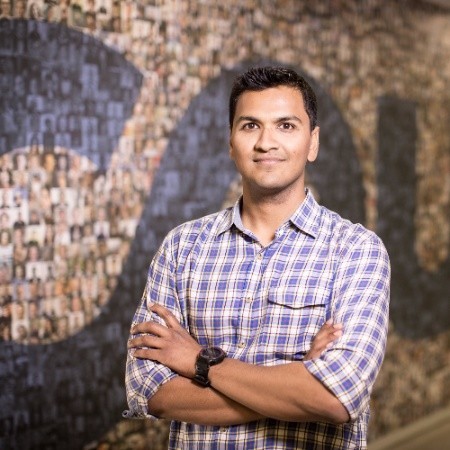
We live in a digitalized world, and it is not a surprise that technological change and automation are accelerating. The skills needed to succeed are rapidly evolving and millions of workers need to reskill themselves to stay job-relevant. The online learning industry has experienced rapid growth over the past years. COVID-19 and the global lockdown have only made this field even more competitive and demanding for the companies.
To address the market's needs, companies and technology experts do everything in their power to make high quality education accessible to anyone and anywhere.
An example of such an expert is an Indian-born Senior IT Product Manager, Kapeesh Saraf. He understood the importance of the quality of instruction already during his studies in one of the best engineering colleges in India.
"I remember this moment in our "hands-on lab" where we were looking at this jet engine that was at least 60 years old. All the equipment in our lab was completely outdated and so was our curriculum. This created in me a strong desire to improve education somehow. I didn't know anything about ed-tech at the time, just knew I'd like to improve education somehow." Kapeesh admits.
His extreme talent, hard work, and love for Silicon Valley got him into Stanford's Management Science and Engineering Program in 2008. This is where Kapeesh received expertise and exposure to design thinking, human-computer interaction, and how technology can solve problems for users. At Stanford, a class called Human Computer Interaction made a huge influence on him and set him on the career of product management. When he learnt about Coursera, he saw that the same course was now available for free to anyone in the world. Given how impactful this course had been on him personally, he fell in love with Coursera's mission to make the world's best learning experience accessible to anyone, anywhere. This led him to join the company.
Coursera was just under 100 people and making less than $10M/year at that time, and Kapeesh helped to grow it to over $400M/year in revenue. Kapeesh joined pre-IPO and launched many new products which helped the company to go public and reach financial success. Right at the start, an IT expert identified the problem with course availability and decided to jump in with the solution: he created a completely new on-demand platform where learners could use the content on their own schedule, like on Netflix. The newly introduced system automatically batched users into cohorts that would have the same schedules and deadlines. This amazing product ultimately evolved and led to the degree business. Through this process, Kapeesh helped to come up with a unique innovation in the industry at that time - "stackable degree model".
This program comprises specialization certificates open for anyone. These specializations count as progress towards the degree program for those who apply for the degree. Over 30 degrees and Master Track programs from top Universities: Michigan, Dartmouth, Imperial College London, University of London, HSE Russia, IITs in India, now use this wildly successful Coursera platform. As of December 2020, more than 50 industry partners, especially platform technology companies seeking to expand their developer communities, offered more than 600 courses primarily in the domains of data science, technology, and business. Industry partners include AWS, Autodesk, The Goldman Sachs Foundation, Google, IBM, LearnQuest, SAS Institute, and Unity Technologies, among others.
Kapeesh and his IT know-how and vast experience have led to another significant development: Coursera Plus. With Coursera Plus, students got access to all courses on Coursera for $59/month or $399/year as opposed to $49/month for an individual course. Like most successful business ideas, Coursera Plus resulted in a dramatic increase in the number of enrolled learners. In the Q3 2021 earnings release, Coursera reported that 25% of consumer revenue was from Coursera Plus, which is really impressive growth.
Similarly to his brilliant career at Coursera, Kapeesh made his mark at Zynga that he joined in 2010. He was a Product Manager and signed to coach to a newly acquired team in Dallas on data-driven product development and free-to-play games. In addition to that, he hired and built out the product management team. Integrating an acquisition was a risky task. Moreover, Facebook games had been declining, so growth was going to be challenging. Kapeesh has proven again to be an extraordinary IT Engineer when he came up with some unique product features driving the growth of the game. Castleville became the biggest Facebook game of 2012 with over 20M monthly players, 8M daily players, and a $200M+ annual revenue run rate. It was not a surprise that Kapeesh was recognized with the Zynga Atlas award and Zynga Product Management Rockstar award that year for his contribution to Castleville. Working at Zynga, Kapeesh has also introduced a brand-new system to connect people to play games together - the system matches potential gaming partners to you, based on the profile. For this innovation, he got awarded a US patent.
Judging from Kapeesh's dedication and drive for innovation, this IT expert will definitely launch some new platforms in the near future. He has already proven his ability to understand customers' needs and to solve problems with break-through ideas. We can only guess which industry he will target now.
![Apple Watch Series 10 [GPS 42mm]](https://d.techtimes.com/en/full/453899/apple-watch-series-10-gps-42mm.jpg?w=184&h=103&f=9fb3c2ea2db928c663d1d2eadbcb3e52)



